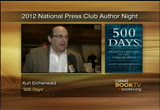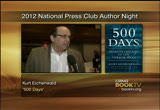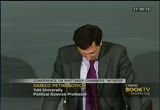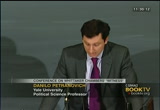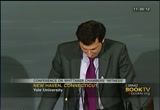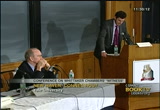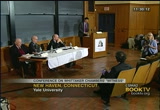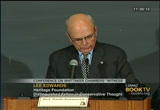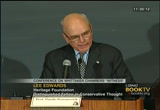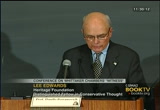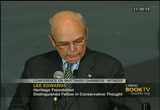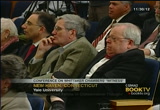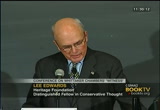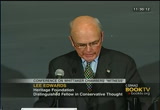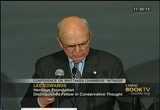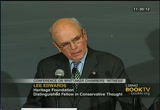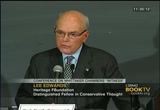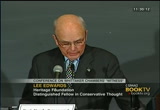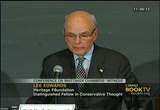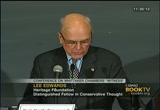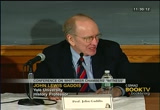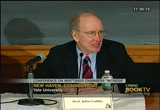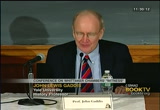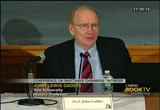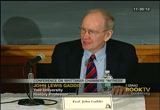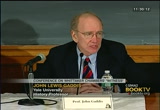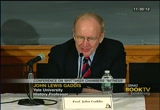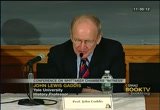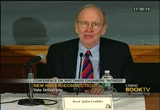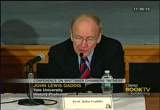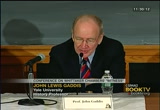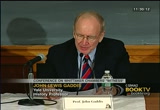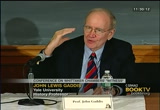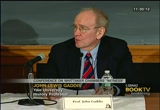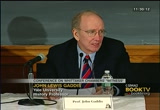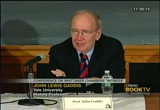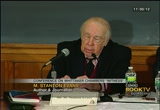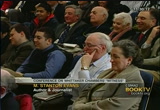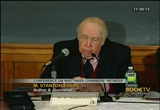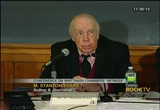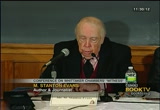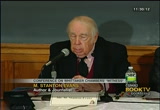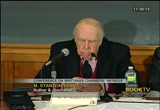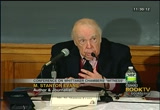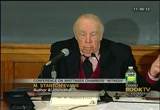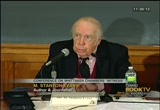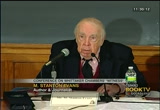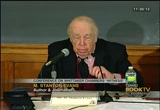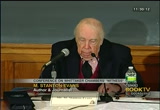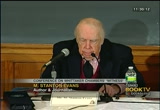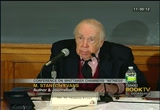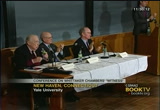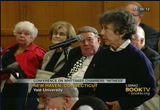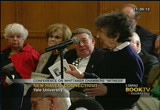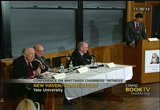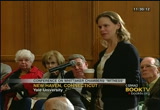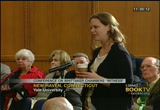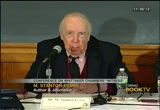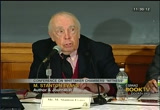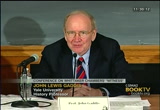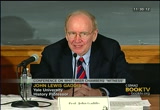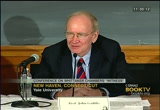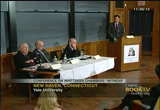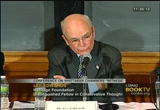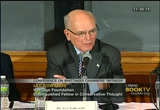tv Book TV CSPAN January 2, 2013 2:00am-3:05am EST
2:00 am
2:01 am
publication of whittaker chambers's "witness". it is a little over an hour. >> thank you. thank you, buckley program at yale. thank you for being here today. last semester i had the privilege to teach a course on the intellect quote legacy of william f. buckley jr.. i dedicated a couple weeks to build buckley's and i communism with a principal and philosophical position. he once told me late in his life
2:02 am
that his most important book may have been odyssey of a friend, the book in which buckley and characteristically barely says or write anything in which he creates a literary and philosophical interview with whittaker chambers. in odyssey we see chambers again bear his soul. to young admirer, friend and colleague. i was struck, most of all by the deep emotional intensity and raw humanity that flows, of so many of these pages. amen is trying to account to himself and two world how he made his choices, where he fell and where he blundered, but also there is no going back, doing the right thing can still mean
2:03 am
anything, not just for his own soul but his family, country and generation. bill buckley as some of you know was a dramatic emotional man, very much so. it is not surprising to me that chambers's odyssey moves bill profoundly. as my students know, bill buckley had many influences but the common in his life that was chambers certainly ranks as the most unexpected. the one to follow last year, at yale,. to help us get started today, who know much about the suspect. we had worked sitting in the middle, is distinguished fellow and conservative thought, the be simon center for principals and
2:04 am
politics. dr. edwards has enjoyed a career as one of the leading historian of american conservatism. his works range from biographies of president reagan to a recent biography of william f. buckley. dr. edwards is founding director of the institute of political journalism at georgetown and was a fellow at the institute of politics at jfk school of government at harvard. john lewis gaddis next to me is one of the leading historians of the cold war. he won the pulitzer prize for his biography of the diplomats george f. cats. john lewis gaddis's work as robert lovett prof. of history and influenced the work of cold war historians all over the world. played a major role on uncovering the role of leadership personalities, the influence of his work can be seen in the 24 part cnn
2:05 am
television series cold war. a graduate of universal -- yale university, class of, can you help me, i was missing that detail. mr. evans, his book blacklisted by history the untold story of senator joe mccarthy and his fight against america's enemies gives an account of the age of mccarthyism during the cold war. evans has been the recipients of honorary doctorates from institutions like syracuse university and the john marshall law school and has won accuracy in media irvine award for excellence in journalism. join me in welcoming our panelists. [applause] [applause]
2:06 am
>> lee, would you like to start? >> it is such a pleasure and honor to be here. once again i was flattered to be asked to participate in the first seminar last year i didn't do too badly. i see some good friends out here and also some people i admire including if senator jim buckley. he deserve a round of applause. let us begin with a paradox. whitaker chambers. whitaker chambers was a soviet spy who became in bill buckley's words, the most important
2:07 am
american defector from communism. and its treasonous adherents, continued in august of 1948 when he identified alger hiss, a golden boy of the liberal establishment as a fellow member of his underground communist cell in the 1930s. this was a former assistant of the secretary of state and adviser to of franklin d. roosevelt, acting secretary-general of united nations' founding conference in san francisco and recently named president of the carnegie endowment for national peace. he emphatically denied chambers's allegation. a great deal more than the reputations of these two men was at stake. if this was innocent, anti communism, and those closely associated with the like richard
2:08 am
nixon. it was dealt a devastating blow. if alger hiss was guilty, anti communism would occupy a prominent part of the political landscape, and his spokesman would become national leaders. furthermore, chambers and alger hiss each represented one side in the epic struggle of the cold war. one man symbolized the philosophy of freedom and western civilization. the other the ideology of totalitarianism and marxism and leninism. both left and right understood that america and the world was at a critical point in history. considered a major political events had transpired between august of 1948 when chambers confronted alger hiss at a congressional hearing. in may of 1952 when chambers
2:09 am
published his managerial and magisterial memoir "witness". in february of 1948, the communists seized control of czechoslovakia's. was the first soviet seizure by force of a free popular government and it stunned official washington. in china mao tse tung's people's liberation army and shanghai check's nationalist forces on the run the following year, the communists would assume command of the world's most populous nation. 1950 was a particularly eventful year. in january scientists called fuchs surrendered to british authorities admitting he was a nuclear spy the same month a halter hiss was convicted of perjury. the statute of limitations on espionage have inspired and he was sent to jail. in may, the fbi arrested harry
2:10 am
gold who identified julius and ethel rosenberg as conspirators in a plot to give nuclear secrets to moscow. in june, north korea invaded south korea and presented the u.s. with a choice, turn back the invasion or allow the communists to secure a key piece on the chessboard of asia. in 1952 whitaker chambers published "witness". which argued that the united states faced a transcendent, not a transitory crisis, was not one of politics or economics but of faith, and secular liberalism, a watered-down version, no wonder the liberals have never forgiven chambers nor have they been neighbor able to forgive him.
2:11 am
and i know stan will be talking about a little bit. that man is alger hiss. and chambers and his place in history without examining alger hiss. willard edwards, observed alger hiss for an estimated 500 hours. in april of 1956, mr. edwards, my father, addressed a large audience of undergraduates at princeton, the evening before alger hiss was scheduled to speak at the university about
2:12 am
u.s. foreign policy. alger hiss on foreign policy. here are some of the things edwards said to the assembled stewards, quote, you will be observing, as adroit and charming personality as i have witnessed in 30 years of experience, quote, you will find it difficult to believe that you are listening to a man convicted by a jury of willful perjury to conceal his role as a traitor and a spy. and alger hiss indignantly denied chambers's allegations that he was the communist, i
2:13 am
have never witnessed a more convincing display of righteous laugh, and swore he never laid eyes and whitaker chambers. he blinked at a photograph of chambers. less than a month later, confronted with chambers' himself, was to confess that he had indeed known the man and knew him intimately and given him an automobile. out for his was not embarrassed. the picture of injured innocence, failed to recall man whose appearance is that of the man in the photograph shown him. this explained that he had known chambers but under another name, that of george crosby. it never occurred to him to think the committee might be
2:14 am
talking about crosby, a did the newspaper man. was at this point, my father said, that i began to realize that alger hiss was a dangerous man. is important to remember that chambers's original charge against his former friend and co-conspirator was not espionage but calm -- communist affiliations only. has many others in the government did in 1930s, he would be involved in the establishment and the in acheson who on the day alger hiss's acceptance said publicly that he would never turn his back on alger hiss. it was not in alger hiss, a man of monumental arrogance to admit he strayed ever so slightly from the path. he was, my father some up, a man
2:15 am
of passion and pathological ? convictions of his own rectitude regardless of overwhelming evidence of guilt. as set forth by our colleague who is speaking to a later. the hiss case informed the american people that there was an internal communist threat. in the 1948 presidential campaign harry truman called any such notion a red herring but communists had infiltrated the federal government all the way up to and including the white house. defending alger hiss became a liberal obsession, consequently the hiss/chambers case contributed to liberalism's lurch to the left and its inability to view the soviet union objectively and to concede that it was a clear and present
2:16 am
danger. the case demonstrated the intimate connection between communism and liberalism, quote, when i took out my little fling and aimed at communism, chambers wrote in "witness," i also did something else. what i hit was the forces of that great socialist revolution which in the name of liberalism is been inching its ice cap. the one x liberal who saw the connection clearly was president ronald reagan. who awarded the medal of freedom. asked why, mr. reagan replied, 100 years ago people will ever forgotten the details but i want them to remember that out his went to jail as a traitor and whitaker chambers was honored by
2:17 am
his fellow citizens. his conviction verify anti communism as a potent element of american politics. it gave bill buckley and other and other conservative they caused by which to unite traditional conservatives and libertarians against the common enemy, liberalism. historian george nash and others argued persuasively that without any communism there would have been no unified conservative movement beginning in 1950s without a conservative movement, and no president-elect reagan in
2:18 am
1980. he could quote from memory the first pages of the forward for many years afterward. and the longtime publisher of national review and libertarian columnist and author john chamberlain and the prince of darkness. whitaker chambers, was one of the great men of the time wrote henry gregory, why? because of his enormous talent as a writer. his steadfast courage on the face of a ferocious liberal campaign to destroy him. his witness to god's grace and fortifying power. whitaker chambers placed every conservative in his debt and for all time. thank you very much.
2:19 am
[applause] >> thank you. we are going to think -- ask our panelists -- professor gaddis. >> thanks to 0 organizers, it is fair to say that have certain guilty, and i have been teaching history of this time and i have certainly been aware of the importance of the new book we are talking about today. my colleague told me she has been assigning this book to her students ever since she came here but the fact is until nathaniel persuaded me to do it,
2:20 am
actually read "witness". i take some consolation in joseph epstein's recent conviction-convention in the weekly standard that he does not got around to reading the bible after all this time. at said in his commentary there is great stuff there. well, that is what i felt about "witness". over the last weekend days or so i have been reading it, every line of it, sitting up late, if you pass by my house you can see a lonely life in the darkness of the house, that is why ipad that has "witness" on it now. it was compelling and it kept me up at nights reading. there is great stuff there. for example, the aphorisms as
2:21 am
that are imbedded, quote, men must do what they think right. and the multiple soviet apparatus in the 1930, the russians believe in bulk. there is faith reflected in it, without god, want only organizes the world against god. there is distinction made about personalities in fundamental ways and there are differences, chambers rights, in the pitch and purpose of life in the full angle. well before i got to the end of this long book, i found myself wishing that whittaker chambers who was a famous and excellent editor had hired one to work
2:22 am
with him on this book.cy because as epstein says of the bible, there are a lot of gaps in it. even sacred texts, he implies, can stand to be shortened in places and perhaps that is true of "witness" particularly as you move through the final part of it. i came with a sense of deep admiration and deep respect combined with getting to know it better. i was reading fangs that hadn't read before. that sense of admiration and exasperation resonated with me and it struck me, as a familiar
2:23 am
emotion, and that combination and exasperation. and a merit these contradictions, they came from that. and what i think the exasperation here being the difficulty, i don't know what i think but i write. the real reason "witness" evoked these mixed emotions in me as i read it came from the parallel that i saw to a more recently book with which i had a closer connection. it is imaginatively titled george f. cats, an american life. i am chagrined that looking at my book that its 800 pages it certainly is not brief. there's not a single reference to whitaker chambers in it.
2:24 am
i appreciate the forbearance of chambers's biographer for not mentioning this embarrassing fact of his long and thoughtful review last winter. i did refer briefly but only obliquely to chambers, and he took a couple pages to say he had followed chambers's case carefully 1/4 century earlier but still was unsure as many people were in 1972 of hutu believe in that case, who was telling the truth. we know the answer to that question much more clearly now thanks not only to the biography of whittaker chambers but the courageous scholarship of allen weinstein and others who followed his pioneering work.
2:25 am
nobody can reasonably doubt the truth particularly in light of the evidence that surfaced from soviet sources in the last 20 years or so. and if you stand in side streets in upper manhattan and shout out alger hiss was guilty. what so strongly struck me in reading "witness" for the first time, however, was less how well it holds up in the light of recent scholarship, that i had known about and expected. what i had not expected in reading this book was what seemed to me to be a number of peace similarities between the personalities of whittaker chambers and a man i spent a lot of time with recently, george f.
2:26 am
kennan. these reside in the fact that neither chamber's nor can 6 categories or the compartments. they did not fit. chambers was a unique blend of romantic religious pilgrims and political revolutionaries. he goes on to say chambers did not stop quarrelling about him. to some he was fascist, to some a martyr, to most a mystery. and on a public review, quote, one is hard-pressed to think of another public individual so consistently driven not merely to revise himself but repudiate himself, agonizingly at times
2:27 am
with the result that his words in defense or rebuttal. and the foreign policy position while canon can be cast in almost any light. he has become his admirers but also his detractors. this got me to think about plutarch and parallel lives, it got me to thinking what would happen with this brief intellectual exercise for friday afternoon, think about the parallel lives of george kennan and whitaker chambers. if chambers and can wear like a few others, how much were they like each other and that is what i will spend rest of my time talking about. chronologically, they are close in part, chambers as most of you know was born in 1901, kennan in
2:28 am
1904 but chambers lived to the aged 60, kennan lived to the age of 101 and delayed in publishing his biography. the source of profuse apologies over the years to me from the subject. and having difficult childhoods marked by a family tragedies. it was the death of his mother two months later, the suicide of a beloved brother and in his 20s. chambers and kennan and i believe education, chambers at princeton but neither in years that followed, part of any establishment. and it is a deep cultural pessimism that was not foreseeing another world war, it
2:29 am
is rooted in 1920s in the post-world war i period, and they're very brief. and his editor it time in world war ii, and in the early days of the policy planning staff to make it work as he wished with the total support of general george marshall, these periods of optimism were fleeting. both men sounded the alarm about soviet intentions. chambers, the roosevelt administration as early as 1939. roosevelt administration through diplomatic reporting from moscow in 1944-45 which he also felt to
2:30 am
have been -- both men found themselves isolated from many contemporaries, even ostracized for having gone out on limbs but kennan's came quickly and less painfully than that of whittaker chambers. neither took satisfaction in vindication. self congratulations for both men, most atypically in the modern age was almost impossible. that is remarkable of the 20th century. one reason for this was religious faith which became deeper for both of these men as they aged but that faith resided in the city of god, not the city of man, hence that phase, minimal expectation beyond bearing witness accomplished in his life.
2:31 am
and the capacity, and leave the little country, the united "% states, survive in a sinister "% world. both were at the same time dedicated american patriots whose only acts of witness eliminated the country's path to survival through this horrible century. the despair was so deep that not only contemplated suicide but actually took steps to make it possible. chambers describes it in "witness," it was the day he went to a garden store in lower manhattan and kicked on damage picked cyanide based -- held in a can and try to mix it with the right amount of water and throw a towel over his head and breathe the fumes and hope to wake up not waking up but he was save by his own shortsightedness
2:32 am
and could not read the instructions on the can and got the proportions wrong. it was during his brief bleak ambassadorship in 1952 when the situation was so grim that kennan insisted that the cia equate him with suicide pills but in the event of war he be in turned in nazi germany in 1942 but feared torture and that is the purpose of the suicide pills in his case. he didn't use them, told me he flushed them down the toilet eventually. that he ordered them is deeply significant. both men later preoccupied themselves and overwhelmed anybody who would read them or listen to them with great fear is, great fears in capital letters, that the new deal and
2:33 am
all that followed was part of the gigantic communist conspiracy, kennan said nuclear-weapons could not be developed and deployed without placing at risk the fate of the earth. the significantly i think were farmers. chambers in maryland, kenna in pennsylvania, finding physical labor associated with that profession, limited refuge that made life and especially family life possible. finally, both were great writers. even if the writing is repetitious. and the idea was compelling against time and space and as reagan was suggesting it will do that in the future. each man produce classical works that will be red as far as we can see. one of which we celebrate here today. in his review in the new
2:34 am
criterion, jim pearson who i think is in here on the way. jim pearson some up kennan in a single sentence, an accomplishment i never came close to achieving in my book. he wrote, quote, and independent thinker of the first order saw something clearly that others saw but for a haze and by an act of singular intellectual courage earned absolution. for any misjudgments he may have subsequently committed. i hope jim would not mind if i change only two words to let some up whittaker chambers, who threw an act of singular moral courage earned absolution for any misjudgments he may have
2:35 am
made previously committed. thanks for your attention. [applause] >> thank you very much. mr. evans, we were going to 03:45 with questions and answers. >> thank you. first of all, it is a pleasure to be back, i had many a class in this building and pleased to say it is the same as it was 60 years ago. hmmm things to not change. partly nostalgia i was a freshman when man at yale came out. i read it at the time. everyone of us in a complete a 4 against it even though no one had read it. i did read it and said this is exactly what is going on here. that was my introduction to bill
2:36 am
buckley who i then met. he was a friend of mine over those many years until he passed away recently. the last time i took the train from washington was to see bill at stanford some years ago. i used to take a all the time to come back and forth, lived outside washington at the time and i always enjoyed writing kindly and i talked about this earlier. the only problem was you had to go through new york and i am always reminded of a little girl who was trying to say the lord's friend got confused and said lead us not into temptation. true or words were never spoken. it is a little better than it
2:37 am
used to be. i read "witness" shortly after it came out. it came out when i was a sophomore. i didn't read it at the time, i read and reread it, in rewards careful study. i have approached it as a new book i co-authored that just came out in which chambers the merges as a central character which was not my intention when i began but the more i look into matters the more i realized chambers was a critical figure -- -- his look among other things apart from literary merits, it is a history of domestic coal, one of the best.
2:38 am
it is not only history but a source, he was a primary source and all of you know that you have to go to primary sources. it is very risky to rely on secondary sources. he was a primary source. he was also -- his book is a guide for the perplexed, there are benchmarks of judgment, standards to this day, in addition to the information he provides. as i delved into some of these things, using some primary sources, mostly fbi files, i realized the centrality of chambers to the whole domestic coal or storage not only in his case but otherwise. the more i learned about his travail and service and sacrifice the more i learned through him about the need for
2:39 am
the internal problems in our security situation in the 1930s and particularly 1940s though he gave most of his testimony about the 30s. he was still around in the 40s and consult often by the fbi. are formulated what i call about that problem evans law of inadequate paranoia. which says no matter how bad you think something is when you look into it is always worse. that was the case with the penetration of the government by agents of the soviet union. on all of which fronts chambers was most instructive. and repeated by the new information, one was the extent
2:40 am
alluded to by the prius speakers of penetration. not only formidable in terms of numbers but in the level of penetration, there are many of these agents and many posts of power but he was not alone. another was harry dexter white of the treasury department. another was lot creek in the white house. these up tough soviet agents at high levels and the government. the second point -- let me follow-up little bit. all of that, he intimates in "witness," is confirmed over again in records from the soviet union, the encryption is which were secret messages send back and forth between the moscow bosses and their agents, the caller was broken by cryptology since the 40s. there were other records from
2:41 am
the soviet union and papers which had recently come forward affecting kgb agent who names many suspects he knew about fro kgb records in moscow. and fbi files, hundreds of thousands of pages on these cases -- a bevy of other -- suspects who were in the government, got there in the 30 and 40s during the war, soviets were allies call all of this over and over again confirms everything chambers had to say and goes beyond what chambers had to say but he did not know everything the fbi knew. everything he knew he didn't know the fbi knew. the second major point off of that, chambers's association which this book is about, the
2:42 am
real issue -- wasn't spying and the÷ññ movies are about, but all the cloak and dagger images, it was policy influence, what these people were doing in some cases was rare, but often with very great success was to tilt american policy in favor of the soviet interests. he made that point strongly, and anything i have seen recent ÷ñ studies, this was a case ñ history, case study, the buildup to pearl harbor, china, yugoslavia, poland, plan for turning germany to cow pasture, the approval of slave labor as
2:43 am
reparations to moscow, and the ñ conference was a major factor, operation keelhaul which turn ñ two million anti-soviet refugees over to the soviets. those are examples and there ar others but those of the one that do know of in which perot soviet operatives within our government tilted policy in favor of communist interests. power points chambers makes over and over again in "witness" confirmed by everything i have seen since which contributed to a very morrow's temperament and with good reason -- as john ñ lewis gaddis pointed out these revelations came not in the 40s
2:44 am
1939. the assistant secretary of çñ state, nothing was done. in 1939, that was ignored at th time in the soviet atmosphere, no one wanted to hear such things. there was misrepresentation when the case surfaced almost a decade later. this made him extremely pessimistic and there's a kind of pervasive sense of doom in ñ the final chapters of "witness" which was personal. a suicide attempt had been mentioned. fortunately did not succeed but also societal. the free world was doomed. the wheat -- one of the reasons he thought that was he believed people in the government, that people would do nothing about it.
2:45 am
he was right in this respect, it is hard to gauge, but he himself was in considerable peril. when he made the revelations he did, went before the house w committee in 1948, testified in public, things that he had said imply long before the fbi, the fbi knew this in 1945, everything chambers said -- we have those records that show that. no one would do anything about it. novel leave that but when he went before the house committee, the white house on that day, august 16th, 1948, there was a meeting at top-level save for w the attorney general, various ñ white house aides to indict chambers for perjury. that persisted well into the en
2:46 am
of 1948. are to cover this in ten minutes as john lewis gaddis knows and lee knows that. alger hiss was far more important than has ever been appreciated, form more important than history students appreciate because they don't have the record. one of the problems in writing ñ cold war and other histories is getting at primary sources. one would think a primary force would be an official government publication. the oldest documents are e-book of a thousand pages, the run-up to what happened in terms of the aftermath at the altar and we discussed some of that in this book. when those papers were compiled, the state department does not
2:47 am
have the primary work and among the papers they do not have 4 papers of edward virginia junior in the secretary of state, when he was in the state department in july of 1945 he took his papers with him and they ñ vanished not a sinister means, they were taken away and not returned. and they published all the documents. many revelations that are in the papers were secret for these ñ many decades. these papers it turns out our university of virginia, and i was able to get them there and you will find many things that are not in the official -- but the main thing i want to stress is they show the role of out for his farm more extensive than anything in the official
2:48 am
compilation. alger hiss was one american at the altar who knew what he was doing. i say that in the most literal sense. the secretary of state for two months at a time was a novice and the new foreign policy.ñ president roosevelt was almost dead. he was very confused on issues. outer his was not confuse. he knew what he was doing and he was a person who have all the paperwork and documents and cables went through him. he was all over the place.t that is in the papers, very ññ little of it in the altered ññ documents. finally -- almost done. chambers said something very somber, very pessimistic, very defeatist really.ññ he said he was leaving the
2:49 am
winning side. it was the one thing about which he was wrong. what convinced him that he was right about that was the ñ unwillingness of people in authority to hear the truth. they denied the truth, ignored the truth, censored the truth ñ and this came to the fore in a grand jury session in 1947-1948 where all these agents were ç paraded to testify. alger hiss, the list is long, ñ they are all in this book, left to walk and left to walk because the prosecutors, one witness against them and elizabeth bentley, and therefore could not convict these people, led the mall walk. and the other witness they could have had -- after u.s. meetings,
2:50 am
broke the case that led to the conviction of alger hiss and we had the minutes of those grand jury sessions pertaining to them. that changed the course of history. whitaker chambers not only lived history and wrote history but z changed history and to this day i don't think we appreciate how important he was in this pivota episode where he broke through the concealment to bring about the indictment and conviction of alger hiss and after that was changed dramatically. my time is up and thank you for yours. [applause] >> thank you, panelists. we have 15 minutes left for questions but before i ask you
2:51 am
to come down and speaking to the mike let me welcome governor daniel to the conference today. your questions are welcome. right behind you if you don't mind. >> i want you to ask the question. >> thank you. >> this is in the nature of an observation. i was very appreciative of professor kennan's concerns, i have to say i was listening to the material, i was rather g struck by another possible o
2:52 am
comparison, extraneously to this conference but i thought rather telling, lance armstrong and here we have another case of an extremely charming man, w righteously continuing to profess his innocence in the face of a very large body of contrary evidence. now, that evidence comes mostly from his teammates who a men of integrity, not as charming as lance armstrong himself. in the case of alger hiss, we have whittaker chambers. those of you who have seen pictures of these two men will have to be struck by the enormous difference in their appearance, out for his urbane,
2:53 am
well-dressed, whittaker chambers, shambles, poorly dressed, his clothes don't really fit. he has bad teeth. he is certainly not a charmer and it seems to me though this is a small sample that it behooves us to think that we need to be wary of charm. [laughter] >> because it may be that slovenly win the day. >> thank you. [applause] >> any comments? >> everything you say is true. someone who is charming -- i appreciate your observations. wasn't just chambers. there were five witnesses
2:54 am
identified. nathaniel while, a few others, elizabeth bentley, wasn't just chambers. documents and -- a reference people think, it is conclusive that alger hiss was what chambers said. wasn't just one or two men. that is all. >> yes? >> the history department here, i wanted to say something -- i wanted to make a quick observation about "witness" and pose a question.bç the observation is for those of you who have read it, "witness" is a fascinating book and people tend to think what is fascinating is its indictment of communism but it is also a
2:55 am
fascinating account of conversion to communism. half of the book is about very early experiences and experiences in the 1930s why he became a communist and that is not always as obvious about the book but very important as a historical document, a primary source. i happen to be writing about j. edgar hoover and my question is for m. stanton evans. he is a figure who has gone down in history as having not been particularly great reputation in a public consciousness in terms of some of the roles he played in the 40s and 50s in terms of the battle against mccarthyism. i am wondering how you see hoover's role in terms of your own research, his relationship with chambers, bentley and other figures and where you came down about j. edgar hoover. >> i am a great j. edgar hoover fan. i spent untold hours that the
2:56 am
fbi going through the archives. i had in my possession 100,000 pages of fbi files. the freedom of information -- fbi agents in the room -- elizabeth bentley when she went to the fbi, this is where she went to the fbi, right here. she was the other major witness against all these suspects. hoover was the stalwart patriot, no question about it. he was meticulous in recordkeeping. anybody see the movie that came out, a marvel of casting, leonardo da capriole as j. edgar hoover. whoever came up with that i would have preferred brad pitt
2:57 am
for that role. it is a pastiche of falsehoods but most of what we're given as alleged history present company excepted is that. i am reminded what mary mccarthy said. every word she writes is a lie including and and the. that is my jaundiced view of what is out there about hoover. he has been smeared for the same reasons whittaker chambers was smeared. finally hoover himself was very skeptical of chambers. these fbi guys didn't just accept anybody telling them stuff. they spent a lot of time backtracking, checking. i might say evasively checking up on people through wiretaps of which there are many in the fbi files transcripts.
2:58 am
raw wiretaps, you never want to go back. that is the real stuff. it is not edited, the real thing. what they did over and over again was find out who was telling the truth and finally determined chambers was the one telling the truth, long before the case was made public. >> john lewis gaddis, you wanted to say something. >> a question i want to raise and it is something that puzzles me in reading "witness," something that has puzzled me in thinking through the new literature that has come out on these issues. that is the in visibility relative invisibility of henry a part wallace. it seems to me an interesting situation because there is soviet documentation indicating
2:59 am
strongly that wallace was regularly reporting to the kremlin in 1945, and 46 in the truman administration cabinet, as secretary of commerce but one thing i came up with with regard to the 1948 campaign was the frustration of a secret effort that kennan and general marshall made to approach the soviets about the possibility of negotiation and that was blown wide open in a way that strongly suggest contact between wallace and the kremlin at the time wallace was running on a progressive party ticket for president. i asked myself, who is the real hero in this story, in this whole history? someone who has gotten a bad rap so far in the whittaker chambers/alger hiss case and got a bad rap from george kennan,
3:00 am
the president of the united states, franklin d. roosevelt who for whatever reason, and we may never know the reason, dumped wallace from the ticket in 1944 and sent him on an inspection trip to siberia where he confused the lags with collective farms. if you want to play the counterfactual game and someone should write a counterfact will novel, change just one thing. truman -- roosevelt does not dumped wallace from the ticket in 44 and wallace becomes president of the united states at the time all of this stuff is breaking loose. what would have happened at that point? why don't more people talk about this? >> we have time for one more question. i will use my prerogative and see if i can engage lee with
3:01 am
this question. the famous letter to my children, the forward to the book "witness," chambers writes the following, quote, page 16, communism is what happens when the name of mine to free themselves from god, a little bit below that, there has never been a society or a nation without god, but history is cluttered with the wreckage of nations that became indifferent to god and died. then he says sums up the crisis of the western world exists to the degree in which it is indifferent to god and to the degree in which the western world actually shares communism's materialist vision. ..
3:02 am
>> he wanted desperately to have chambers on board. if you begin to think about what can draw together people, and that's what i'm particularly interested in and have written about and talked about and referred to here, bringing together the various straining the conservatism, the traditional conservatives, libertarians, and others, what could do that? what could bring them together? at one level, i think it
3:03 am
certainly was the realization that communism as personified by the soviet union was a clear and present danger, and bill reached out to traditionalists like russ of kirk, libertarians like frank meyer and said, please, let's come together, form this magazine and this movement, also part of what he was trying to do. i think at the same time that if you look at chambers' life, he was very indifferent to materialism. it did not really matter to him as all. you can see there's all kinds of things, which, for example of after writing "witness," there was book contracted he was offered. he could have made an extraordinary amounts of money writing a sequel or a follow-up on it, but he said he said what needed to be said and retired to
3:04 am
the farm there on the western shore of maryland. he was not a materialist at all, and that wouldn't have interested bill bucley either or interested the conservative movement at that time. the danger, which was so clear to them in the soviet union and in communism. >> well, thank you very much. we will reconvene in ten minutes
198 Views
IN COLLECTIONS
CSPAN2 Television Archive
Television Archive  Television Archive News Search Service
Television Archive News Search Service 
Uploaded by TV Archive on

 Live Music Archive
Live Music Archive Librivox Free Audio
Librivox Free Audio Metropolitan Museum
Metropolitan Museum Cleveland Museum of Art
Cleveland Museum of Art Internet Arcade
Internet Arcade Console Living Room
Console Living Room Books to Borrow
Books to Borrow Open Library
Open Library TV News
TV News Understanding 9/11
Understanding 9/11